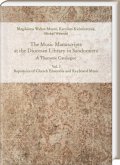The role of music during the German occupation of Norway (1940-45) proves to be an exceptional case for cultural opposition in a dictatorship. Few famous musicians, some local celebrities and innumerous hardly known activists preferred artistic instead of militant means to demonstrate reluctance, spread information, contradict the legitimacy of the German occupants and raise the moral strength of fellow countrymen in Norway and abroad, while risking to be caught, incarcerated and driven into exile. The indispensable advantage was the popular belief of art as an apolitical matter so that music even could reach into fields that would have been inaccessible to open political agitation.Based on considerable findings in public archives and private collections, this book discusses music in concentration camps in Norway and the fate of Jewish musicians, portrays choirs, military ensembles, orchestral and church music in Norway. It further analyzes Harald Sæverud's 5th symphony and MosesPergament's choir symphony Den judiska sången, illustrates the exile of musicians in Stockholm and discusses resistance music in historic media such as the Errol Flynn-movie Edge of Darkness (1943), recapitulated by a model for music as resistance.
Hinweis: Dieser Artikel kann nur an eine deutsche Lieferadresse ausgeliefert werden.
Hinweis: Dieser Artikel kann nur an eine deutsche Lieferadresse ausgeliefert werden.







